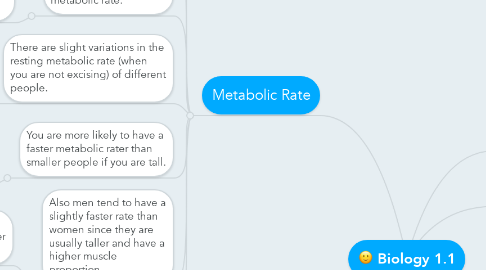
1. Balanced Diet
2. Metabolic Rate
2.1. You need energy to fuel chemical reactions in the body that keep you alive.
2.2. These reactions are called your metabolism.
2.3. And the speed at which they occur is called your metabolic rate.
2.3.1. Which is why carbs and fats are important they release energy that fuells the chemical reactions to keep you alive.
2.4. There are slight variations in the resting metabolic rate (when you are not excising) of different people.
2.4.1. E.g muscle needs more tissue. Which means (if everything is equal) people with a higher proportion of muscle to fat in the body will have a faster metabolic rate.
2.4.1.1. People that are physically fit have a faster metabolic rate compared to people that are not physically fit.
2.5. You are more likely to have a faster metabolic rater than smaller people if you are tall.
2.5.1. Which is why it is rare to find a tall person that is obese .And more common to find a small person that is obese
2.6. Also men tend to have a slightly faster rate than women since they are usually taller and have a higher muscle proportion.
2.6.1. Other factors could change the speed such as being pregnant, regular exercise and if your parents have a faster metabolic rate.
2.6.1.1. which is why usslay you dont see two obese parents and one skinny child or visa versa. You generally see a consistent body size in the family
2.7. When you exercise you obviously need more energy.So the rate during exercise and stays high for sometime after you finish your exercise.
2.7.1. So people who have more active jobs need more energy on a daily basis.
2.7.1.1. For example PE teachers require more energy per day than office workers.
2.7.1.1.1. When you sleep you burn 4.5 kilojoules a minute but if you swim you burn 35 kilojoules per minute.
